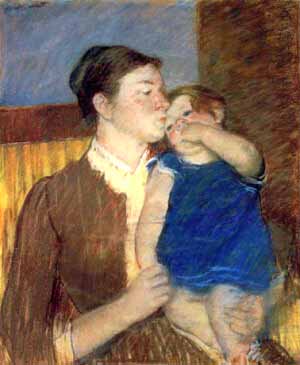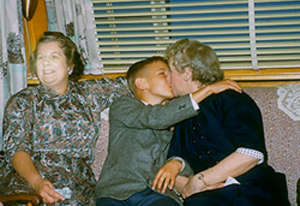(http://www.traditioninaction.org/religious/k016rpEmbraces.html; accessed Jan. 3, 2017):
In these matters I am always hoping to speak with the mind of the Church. I am sure that research in the good manuals of Moral Theology and the analysis of healthy customs in Catholic countries of happier times - I mean before Vatican II - will readily confirm these guidelines.
Kisses and embraces
A married man or woman should kiss his/her spouse, his/her children, his/her parents and his/her brothers and sisters. These are the relatives of the first degree. The rule stops here. In-laws, uncles, aunts, cousins, nieces and nephews are not included in this rule. They are relatives of the second degree and should be treated with more distance.

Appropriate: A mother kisses her child on the forehead
Two exceptions to this norm that are accepted: grandparents may kiss grandchildren; Godfathers or Godmothers may kiss their Godchildren.
Kissing persons beyond this circle is Liberalism. It should be avoided if one wants to follow Catholic Morals and avoid occasions of sin.
The reason for this rule regarding relatives of the first degree is quite simple and wise. Nature normally arrests any sexual attraction among these close relatives. In a well-constituted family that dresses modestly, a brother is not attracted to his sister, or a father to his daughter. The first horror of incest is that it is a crime that violates this natural protection that exists among those of the same blood.
This law of natural protection, however, does not apply to the in-laws. A married man can be - and frequently is - attracted to a sister-in-law. It weakens also with regard to the children of the in-laws - cousins, nieces and nephews.
Obviously, attraction can easily exist in relations with friends of the opposite sex. Hence the prudent rule: Do not get too close. Do not kiss.
Different kinds of kisses
When I say that parents may kiss children, etc, in no way am I referring to mouth-kisses. Unfortunately, it is becoming more frequent to greet one another with kisses on the mouth in our corrupted society.

Parents or relatives should not kiss children on the mouths
Kisses on the mouth should be reserved exclusively to the spouses when they are not in company of others. Spouses should not kiss this way except in private. In front of their children or friends – for example, when a man arrives at home or leaves the house – he should embrace his spouse and kiss her on the forehead or cheek.
Children may kiss their parents on their cheeks and vice-versa. In days past, there was the better custom of children kissing their mother’s or father’s hand, asking her/his blessing. To kiss the hand of parents and grandparents used to be the rule. This rule would admit some exceptions: at the child’s birthday or other special occasions: the mother would kiss her son on his cheek; the father would kiss his daughter on her cheek when she would graduate, leave for a trip and similar situations.
Brothers and sisters normally kiss each other on the cheek. If a brother is much older, he may kiss his little sisters on their foreheads.
Convenient and inconvenient embraces
There are also different kinds of embraces that reflect diverse degrees of affection or friendship.

If she is not your wife don't give her a full embrace
The full embrace is the one where the arms of one person goes around the shoulders of the other and grasps the other person with more or less pressure. This embrace is normally reserved to spouses. After a period of absence, brothers and old friends who are like brothers, embrace each other with sonorous claps on the back. This is admissible and even picturesque as long as the embrace is not too long or does not happen too often. The same full embrace is also understandable among sisters or close friends who are like sisters when they console one another in some unfortunate event or to commemorate some extraordinary occasion.
Brothers and sisters should not give each other full embraces. In-laws, cousins, etc, also should not embrace this way. The same applies to close friends of the opposite sex.
The typical embrace or simple embrace is when one person raises his arms and touches the other on his/her shoulders. The short embrace is when a person touches the other on both elbows. These embraces normally do not last very long.
When are such embraces allowed? A father at times gives an embrace to his grown son to express his esteem. When a man welcomes a guest in his houses, he salutes him with an embrace or a short embrace, depending on the degree of warmth he wants to transmit.
The embrace or the short embrace may be given to relatives of second degree or close friends of the opposite sex as long as they are not followed by kisses.
To be or not to be alone with friends of the opposite sex
As a rule, a married man or woman should avoid being alone with friends of the other sex. For the sake of his/her reputation, as well as the family’s stability and happiness, the person should always look for a third party to be present when a real necessity exists to meet a friend of the opposite sex without his spouse.

Appropriate: A short embrace is habitual between friends
When such a meeting takes place – for example, between a wife and a male friend – she should always tell her spouse where she is so he knows and can be there should he so desire. If such a meeting must take place without a third party present, the doors to the room where they are meeting should never be closed and the persons should be in the sight of others.
These were the wise principles that were born from Catholic prudence. I realize the liberal mentality that prevails today would judge them overly suspicious and expressing a lack of confidence in the spouse. Nonetheless, they actually constitute part of the vow of fidelity in matrimony. When the spouses give each other the full right over their bodies and promise to be faithful to one another, they are also granting each other the right to ensure this fidelity.
This is why the wife has the right to ask her husband to not have a young and beautiful secretary at his office with whom he stays long periods of time alone, but rather an efficient man or an elderly lady. It is also justified for the husband to request that his wife not have private classes with a handsome young man in their home. Such situations, which do not relate directly to your question, are nonetheless good to know in order to maintain the stability of the marriage.
These are some concrete guidelines I can offer to help you be entirely Catholic. I know that according to the fashions of our time, they may seem very out-of-date. But a truly Catholic man or woman never fits in perfectly with the world. To be Catholic is both our cross and our banner.
In Christ Jesus,
Fr. Paul Sretenovic
No comments:
Post a Comment
All comments ad hominem or deemed offensive by the moderator will be subject to immediate deletion.